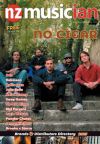The Lawful Truth: Top 10 Legal Tips – Part 1
The Lawful Truth: Top 10 Legal Tips – Part 1
In this issue of NZ Musician we’re going to step back from considering specific issues and instead look at the first five of the top 10 legal tips for musicians in NZ.
The Lawful Truth columns have, over the years, discussed many important legal issues that all those involved in the NZ music industry should be aware of. We’ve covered everything from recording agreements to publishing agreements and touched on important topics like copyright and performers’ rights.
As well as all this sort of specific information and topics there are also a number of guiding principles that, if followed, will go a long way to making sure you don’t run into more general legal problems in the music industry. So in this issue of NZ Musician, and continuing in the next, were going to take a bit of a step back from specific issues and look at our top 10 legal tips for musicians in NZ.
1. Don’t sign anything unless you really understand it.
Contracts often seem as though they are written in a different language, and consequently you should never sign anything unless you have had advice from a lawyer first on exactly what the contract really means for you. If you sign something you shouldn’t have, you can be stuck with the ramifications for a long time. If someone is pressuring you to sign something before you have had a chance to get some advice on it then that in itself is a VERY good reason to get in touch with your lawyer asap.
2. If you reach an agreement with someone then get it in writing.
It may surprise you to know that a contract does not always have to be made in writing and signed – sometimes just verbal contracts can be legally binding – but it is certainly not black and white. Because of the informal way that the music industry often operates it is not uncommon for agreements reached between parties to not be accurately recorded in writing. Avoid this wherever possible.
When disputes break out over deals or agreements without a clear agreement in writing (eg. by email correspondence) it’s incredibly hard to prove exactly what was originally agreed. This can be made worse if one party decides to be less than honest in terms of what they claim to recall about the deal. Drafting up a written agreement will also give you the opportunity to discuss and agree all details of the transaction which may not otherwise be dealt with when you just reach a verbal agreement.
3. If the way your agreement works in practice changes from what is provided for in the written contract then have the written contract amended.
An agreement which becomes out of date and so doesn’t accurately reflect how you and another party are now doing business together can cause a lot of problems. If you and (or) the other side start to do things in a different way than what the original contract provided for, make sure you have the contract amended to accurately record your new business practices.
4. All bands should have a written band agreement.
Many bands start off in a very informal way but over time a group can build up a great number of assets. These assets can include physical items such as band equipment and studio recordings, as well as intangible assets such as the intellectual property rights associated with a band name. All of these assets are valuable and if a clear agreement is not reached as to how all they will each be treated when someone leaves the band, or when the band breaks up, problems often arise.
Amongst other things this can even result in quite legitimate fights over who has the right to use the band name. The sooner you get a band agreement in place the better. Once a band starts to achieve some degree of success some people can become quite unreasonable when it comes to agreeing the rights in various band assets.
5. Join APRA/AMCOS and Recorded Music NZ.
Following on from putting in place a band agreement, a band should always make sure that they agree on the songwriting splits in any songs they write as soon as possible. These songwriting splits should then be registered with APRA/AMCOS (www.apra.co.nz). It’s free to join and by combination of both organisations you will ensure you receive due public performance and broadcasting income as well as mechanical and certain digital income collected in respect of your songs.
Recorded Music NZ (www.recordedmusic.co.nz) also collects certain public performance, broadcasting and other income from the use of sound recordings (as opposed to songs). Joining these organisations and registering your songs and recordings with them should be an absolute priority.
In the next Lawful Truth column well be looking at five more legal tips to help keep you safe in our music industry.
David McLaughlin is a specialist music lawyer with Auckland law firm McLaughlin Law (www.mclaughlinlaw.co.nz).
Disclaimer: This article is intended to provide a general outline of the law on the subject matter. Further professional advice should be sought before any action is taken in relation to the matters described in the article.

